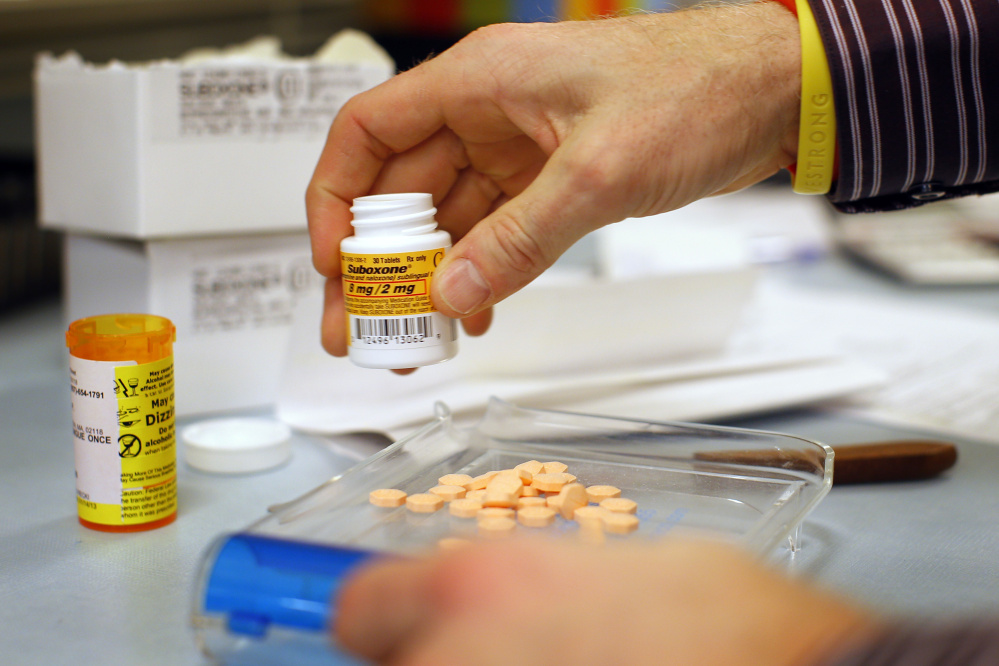Maine Attorney General Janet Mills joined attorneys general from 35 other states in filing an anti-trust lawsuit Friday against the manufacturer of Suboxone, a prescription drug used to treat opioid addiction, for allegedly conspiring to keep generic versions of the drug from the market.
The lawsuit accuses Reckitt Benckiser Pharmaceuticals, now known as Indivior, of violating state and federal antitrust laws by conspiring with MonoSol Rx to switch Suboxone from a tablet version to a film that dissolves in the mouth, a slight change designed to prevent a generic alternative from being marketed so as to maintain market share.
Suboxone is used to treat opioid addiction by reducing cravings. No generic alternative that’s the exact equivalent to the brand-name drug is currently available, although there are similar drugs that are generic and other brand name drugs that potentially could compete with Suboxone.
“It’s appalling that in this culture, where we have one person per day just in Maine dying from drug overdoses, to not have all of the life-saving products available at an affordable price is unconscionable,” Mills told the Press Herald.
“The company intends to continue to vigorously defend its position,” according to a brief statement from Indivior, a U.K.-based company that makes Suboxone that was spun off from Reckitt Benckiser two years ago.
OVERDOSES ON RECORD PACE
The lawsuit comes at a time when Mainers are continuing to die at a record pace from drug overdoses, including 272 in 2015 and 189 through the first six months of this year. Most of the overdoses were caused by opioid abuse, such as heroin and prescription opioids. State health officials and substance abuse treatment providers have been grappling with how best to combat the epidemic through medication and other means.
A June Portland Press Herald/Maine Sunday Telegram poll found that six in 10 Mainers know someone who has either used heroin or abused prescribed opiate painkillers within the past five years.
According to the lawsuit, Reckitt introduced Suboxone in 2002 in tablet form and had exclusivity on the drug for seven years, meaning no generic version could enter the market during that time.
Before the seven years ended, Reckitt worked with MonoSol to create a new version of Suboxone that was a dissolvable film. The suit alleges Reckitt turned the market for Suboxone away from the tablet to the film through marketing, price adjustments and other methods, until the majority of Suboxone prescriptions were written for the film and Reckitt took the tablet out of the U.S. market.
The attorneys general who are suing allege that the move was illegal “product hopping,” where a company makes small changes to a product to extend patent protections, to keep other companies from entering the market with cheaper generic alternatives.
However, whether a successful lawsuit would have any practical effect on prices is unknown, said Mark Parrino, president of the New York-based American Association for the Treatment of Opioid Dependence.
“I don’t think what (Indivior) did is that uncommon of a practice in the pharmaceutical industry,” Parrino said. He said there are currently six to eight generic or brand-name products that could potentially compete with Suboxone, including one that is not a film, but dissolves in the mouth. The other products are tablets, he said.
“Is what has happened really unfair and improper business practices?” Parrino asked.
Mills believes the evidence will show that Reckitt’s efforts did work to artificially keep prices of Suboxone high.
EXPANDING ACCESS
Dr. Mark Publicker, a Maine physician who prescribes Suboxone, said there are barriers to prescribing some of the alternatives to Suboxone, most notably that many private insurance companies and MaineCare do not have the alternatives on the list of accepted drugs, meaning that patients would have to pay much more for them out-of-pocket.
Publicker said if state government and the health care system worked to make the Suboxone alternatives more available to patients, possibly by including them in health insurance plans, that could help reduce prices. As it stands now, Publicker said the price difference between Suboxone and the alternatives is not that great – Suboxone costs about $1 or $2 more per dose.
Publicker said the state should be more concerned about expanding access to Suboxone or similar treatments, as there is a lack of doctors prescribing Suboxone and patients without insurance can’t afford the drug. The federal government recently increased the cap on the number of Suboxone patients a doctor can care for from 100 to 275.
Suboxone treatment costs about $5,000 per year.
“The cost of the treatment is far less than the cost of the disease,” Publicker said.
According to the suit, the Suboxone film provides no benefit over the tablet and Reckitt is still selling the tablets in other countries, even after they were removed from the U.S. market. The suit says Reckitt also expressed safety concerns about the tablet that were unfounded, to intentionally delay FDA approval of generic versions of Suboxone.
The attorneys general claim the result is that consumers are paying artificially higher prices since late 2009, when generic alternatives of Suboxone could have become available. During that time, annual sales of Suboxone topped $1 billion.
The lawsuit was filed in the U.S. District Court for the Eastern Division of Pennsylvania and accuses the companies of violating the federal Sherman Act and state laws.
Counts include conspiracy to monopolize and illegal restraint of trade. The attorneys general have asked the court to stop the companies from engaging in anticompetitive conduct, to restore competition, and to order appropriate relief for consumers and the states, plus costs and fees.
Send questions/comments to the editors.




Comments are no longer available on this story